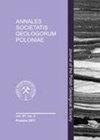How many extensional stages marked the Variscan gravitational collapse in the Bohemian Massif?
IF 0.9
4区 地球科学
Q2 GEOLOGY
引用次数: 2
Abstract
Tectonic development of the Variscan belt in Central Europe included, besides important compression, also an extensional phase related to gravitational collapse, which governed the origin of many sedimentary basins and magmatic bodies. One of these bodies is the Benesov pluton, featuring primary magmatic fabrics as well as deformational fabrics, related to subsequent extensional stages. Recognition of these fabrics and their links to other significant extension-induced structures in the Bohemicum and Moldanubicum not only sheds new light on the pluton itself but also extends a general knowledge of deformational stages, accompanying gravitational collapse of the Variscan orogen. The authors found that this pluton was strongly strained in a normal-faulting regime under brittle-ductile conditions. The age of deformation is constrained by a magmatic age of 347 ±3 Ma and by the age of Carboniferous sedimentary cover. New data indicate a three-stage extensional history during the phase of gravitational collapse: (1) Tournaisian extension (~350–345 Ma) within arc-related tonalitic intrusions; (2) late Visean to Serpukhovian extension (~332–320 Ma), connected to the brittle-ductile unroofing and origin of a NE–SW basin system; and (3) Gzhelian to Cisuralian extension (~303–280 Ma), related to normal faulting and sedimentation in “Permo–Carboniferous” troughs, elongated NNE–SSW. Consequently, the gravitational collapse studied involved a complex succession of individual extensional stages, rather than a simple process.波西米亚地块的瓦里斯坎引力坍缩标志着多少个伸展期?
中欧瓦里斯坎带的构造发育除了重要的挤压期外,还包括一个与重力塌陷有关的伸展期,该伸展期控制了许多沉积盆地和岩浆体的起源。其中一个是贝涅索夫岩体,其特征是原始岩浆构造和变形构造,与随后的伸展阶段有关。对这些构造及其与波希米亚和摩尔丹努bicum中其他重要伸展构造的联系的认识,不仅为岩体本身提供了新的认识,而且扩展了对伴随瓦里斯坎造山带引力崩塌的变形阶段的一般认识。作者发现该岩体在脆性-韧性条件下处于正断裂状态。变形年龄受岩浆年龄(347±3 Ma)和石炭系沉积盖层年龄的制约。新资料表明,在重力坍缩阶段,有三阶段的伸展史:(1)图尔纳期伸展(~350 ~ 345 Ma)在弧相关调性侵入体内;(2)晚Visean—Serpukhovian伸展(~332 ~ 320 Ma),与NE-SW盆地体系的脆性-韧性拆顶和成因有关;(3) Gzhelian - cisurian伸展(~ 303-280 Ma),与“二叠-石炭系”槽的正常断裂和沉积有关,NNE-SSW拉长。因此,所研究的引力坍缩包含了一系列复杂的伸展阶段,而不是一个简单的过程。
本文章由计算机程序翻译,如有差异,请以英文原文为准。
求助全文
约1分钟内获得全文
求助全文
来源期刊
CiteScore
2.60
自引率
7.70%
发文量
6
审稿时长
>12 weeks
期刊介绍:
Annales Societatis Geologorum Poloniae (ASGP) is the scientific journal of the Polish Geological Society. Original contributions and review articles are considered for publication in Annales Societatis Geologorum Poloniae. Submissions for publication may be from all branches of the geological sciences, including applied and economic geology, as well as discussions of papers, previously published in the journal. The language of the journal is English.

 求助内容:
求助内容: 应助结果提醒方式:
应助结果提醒方式:


